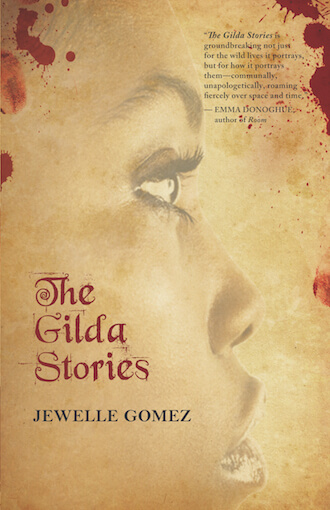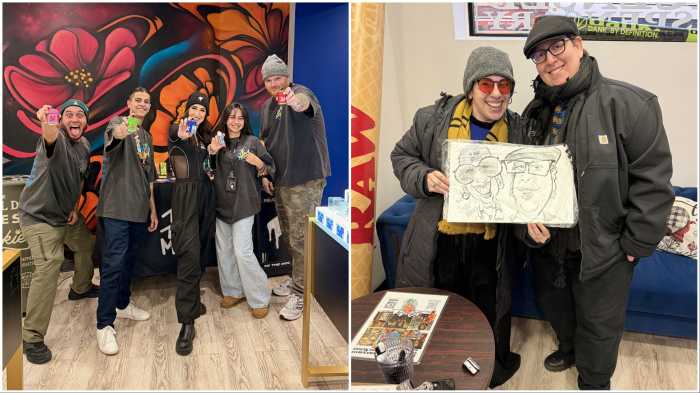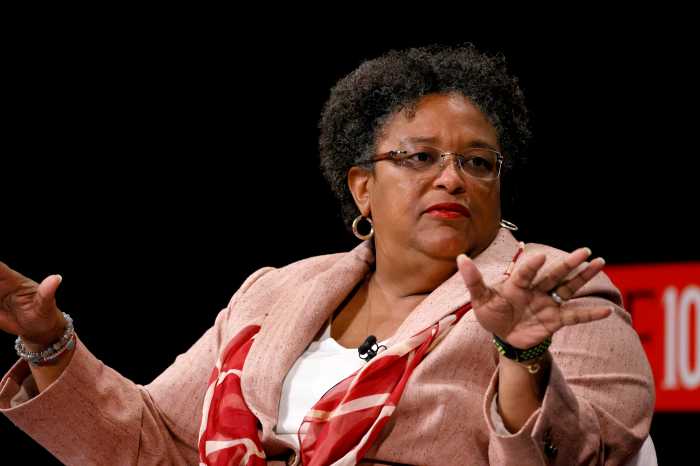BY KELLY COGSWELL | When “The Gilda Stories” came out in 1991, vampires weren’t such a big thing, and black, lesbian ones were unheard of. But that didn’t matter to Jewelle Gomez, who at first was just writing for revenge. Cat-call her, harass her on the street and she would rip your throat out — in a story.
Gradually, though, these scenes deepened into a novel that not only changed the demographics of vampire stories, but endured as a lesbian classic, an escaped-slave narrative, and an important work of Afro-Futurism that continues to influence young writers, especially young writers of color.
The story is launched when a young unnamed slave runs away, killing a slave hunter who finds her. Still covered with blood, she crosses paths with Gilda, a white woman and brothel owner who takes her in. After the girl gets older, Gilda and her companion, a Native American called Bird, reveal that they are vampires, and she willingly enters the life. When the first Gilda dies, this young woman adopts her name, and becomes the second Gilda.
A Dyke Abroad
It could have been a series of satisfying adventure stories, with Gilda romping around with delectable mortals, perhaps in a leather bustier, while she slays bigots and rapists. In fact, deaths are kept to a minimum. Older vampires teach young Gilda to take blood without killing, and share something in return: hope, knowledge, health. This is a code of honor that Gomez said she learned as a feminist.
“The more power you have, the more responsibility,” she told me in a recent conversation.
What intrigued me most about “The Gilda Stories,” though, was how the novel used the convention of immortality to grapple with time and the nature of social change. After all, vampires don’t just suck blood, they live forever. This part of the mythology allowed Gomez to imagine the life of a black queer woman through almost two centuries from a small Missouri town in the 1920s to Boston’s South End in the ‘50s, and the Off Broadway theater of 1971 New York framed by black liberation and the Attica Prison Riots.
In a brief jump to the ‘80s, we find her with a circle of black lesbian friends.
The book was written at the height of the AIDS epidemic in the US, and the final chapters leave us in 2050 where a similar disease is ravaging the world and only the rich can survive, by either fleeing in space ships or hunting vampires and compelling them to share their immortality.
The ending surprised me. Narratives involving social issues almost always finish on a positive note, as if equality were inevitable, part of some upward arc, and we activists can invoke it with our own chants. “What do we want?” “Justice!” “When do we want it?” “Now!”
Gomez, though, emphasizes cycles. In fact, in an echo of Virginia Woolf’s suicide, the first Gilda chooses to take the True Death just before the Civil War because she can’t stand to see more war and destruction.
The second Gilda is repeatedly cautioned by Sorel, one of the oldest vampires, to step back from the mortal world. Just like queers, vampires create their own communities and families. Keeping her distance is especially hard for Gilda, maybe because she has a vested interest. Gilda may be tough to kill, but she remains black and queer and female, at risk every time she enters the public space whether it’s a dusty road in the 19th century or a deserted street in the 20th.
When I asked Gomez about this emphasis on cyclical time, she said she’d probably been influenced by her great-grandmother. Not just that she was a Native American, which gave her a different perspective, but that she was born in the 1880s.
“Imagine. It was a whole different world. She was trying to make sense of how we got from one place to another.” Feminism also taught her that you just don’t get everything at once. You have to “chip away at liberation.”
Especially if you’re a black woman. In the late 20th century, we see Gilda surprised by her own persistent anger about “the disappointment that she’d seen on the faces of black women over the years.” Not just due to white racism, but to black men with a vision of liberation that rarely included the freedom of women or LGBT people or Puerto Ricans.
Gomez confessed that in an earlier draft, all the embattled vampires climbed into space ships and left, leaving the humans to deal with their own messes. But when her editor asked her to think about what it would mean in moral terms if Bird had to give up her land a second time, Gomez decided they had to stay and fight. If there is redemption here, it is that she doesn’t have to do it alone, but with her chosen family.
A 25th anniversary edition of “The Gilda Stories” was released in April by City Lights Publishers ($11.87 at citylights.com). Kelly Cogswell is the author of “Eating Fire: My Life as a Lesbian Avenger,” from the University of Minnesota Press.
































